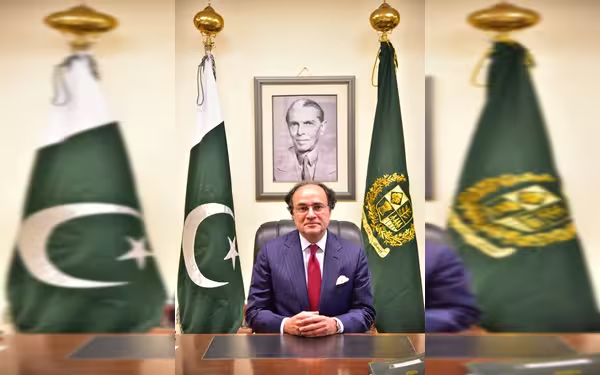Thursday, July 4, 2024 05:58 PM
Muhammad Aurangzeb leads Pakistan towards interest-free economy
- Transition to Islamic banking branches nationwide
- Abolition of riba (interest) advocated by lawmakers
- Focus on agricultural growth, tax reforms, and SOE restructuring
 Image Credits: Reuters
Image Credits: ReutersMuhammad Aurangzeb announces Pakistan's move towards an interest-free economy through Islamic banking, aligning with the Federal Shariat Court's ruling. The government emphasizes agricultural growth, tax reforms, and State-Owned Enterprises restructuring for economic stability.
The Federal Minister for Finance and Revenue, Muhammad Aurangzeb, announced the government's initiative to transition towards an interest-free economy by establishing Islamic banking branches nationwide. This move aligns with the Federal Shariat Court's ruling to eliminate the interest-based system in Pakistan. Aurangzeb emphasized the need to replace the current system with Islamic fiscal principles, following the FSC's directives.
During a parliamentary session discussing the country's economic situation, lawmakers advocated for the abolition of riba (interest). Sunni Ittehad Council legislator Ali Muhammad Khan proposed the formation of a special parliamentary committee for this purpose. The FSC's verdict, issued in April 2022, mandates the implementation of an Islamic and interest-free banking system within five years.
Aurangzeb highlighted Pakistan's foreign exchange reserves of $8 billion, dependent on interest. He anticipated a new IMF tranche of $1.19 billion, expected to boost reserves to $9-10 billion by June. The minister stressed the importance of agricultural growth, aiming for an annual rate of 5-6%, and emphasized the potential of the local livestock sector.
Furthermore, Aurangzeb outlined the government's focus on tax enforcement measures, expanding the tax base, and reforming State-Owned Enterprises (SOEs) to enhance economic growth. He reiterated the support received from friendly nations for Pakistan's economic development.
In conclusion, the government's efforts to shift towards an interest-free economy and implement Islamic banking practices reflect a significant step towards aligning Pakistan's economic system with Islamic principles. The focus on agricultural growth, tax reforms, and SOE restructuring signals a comprehensive approach to fostering economic stability and growth in the country.













